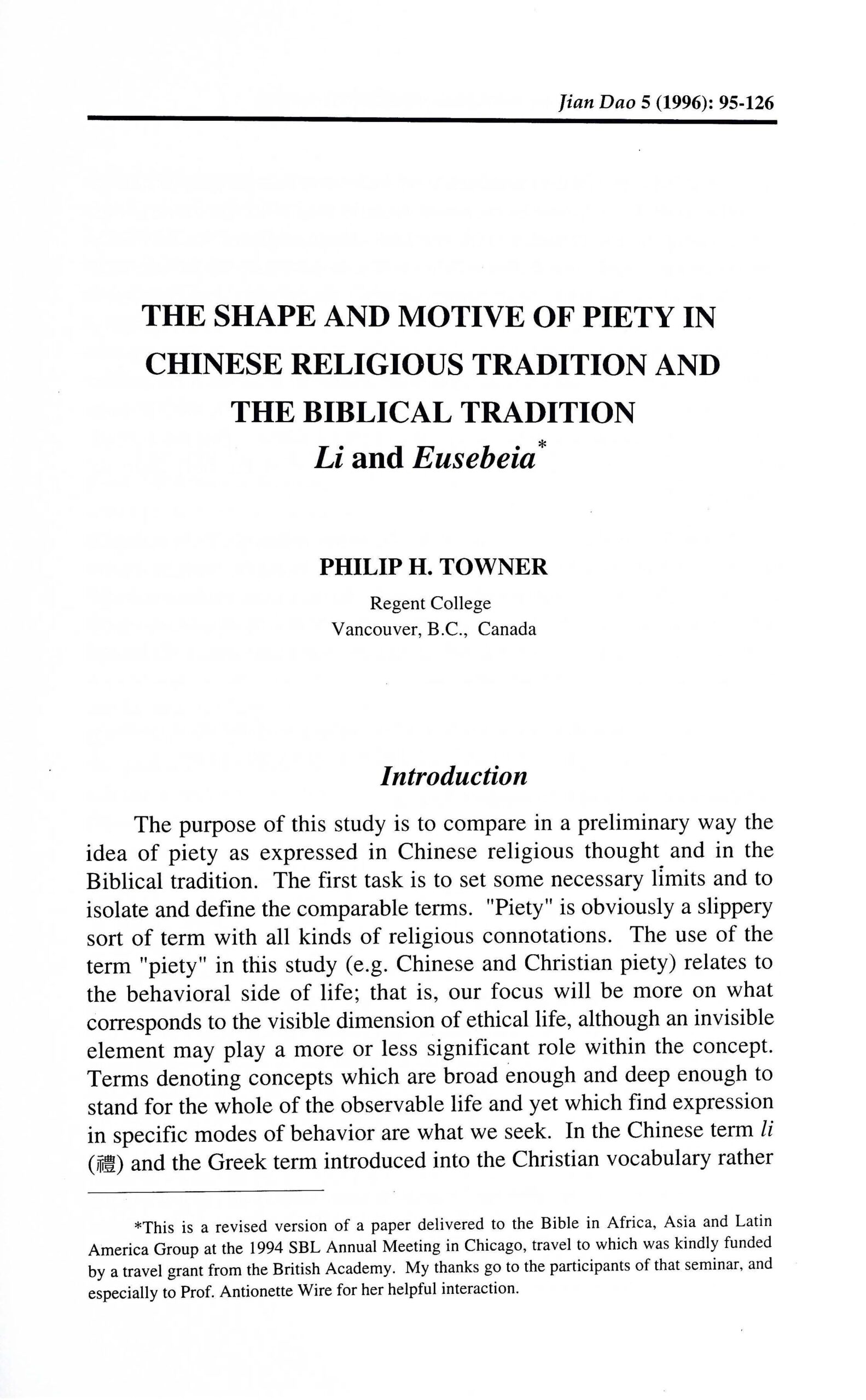The Shape And Motive Of Piety In Chinese Religious Tradition And The Biblical Tradition (中國宗教傳統與聖經傳統中敬虔的模式與主題) / Philip H. Towner 唐書禮
撮要
中國的宗教思想和聖經的傳統對敬虔同樣重視,即是中國的禮,和希臘 eusebeia。在這兩方面「敬虔」都是人際關係中最重要的一環,而且與道德生活其他層面的關係是對等的。兩者在敬虔的共通之處,使這兩種傳統可以有效地對話。然而從孔夫子的禮和聖經的eusebeia來看,中國人的敬虔與基督徒的敬虔大有迥異。中國的敬虔既保守又階級化,強調倫常秩序,一成不變地鼓吹可以永遠確保人際關係和諧的規矩。中國的敬虔讚揚人類的美德。反之,基督徒的敬虔是有關神學的概念,並非人常秩序的概念——這個基督裏新的辯證法,就是對神啟示延續不斷的回應。它具有溝通性:嘗試在人類生活的實際關係中展示神的真實;它具有變革性:尋求讓人際關係成為表達仁愛和服事的工具。我們必須認清中國和基督教敬虔的異同,但「敬虔」確實為中國基督教提供了有利的話題。
ABSTRACT
Chinese religious thought and the biblical tradition share an emphasis in what may be called piety-li in Chinese and eusebeia in biblical Greek. In each case, “piety” finds expression above all in the context of relationships, and equally is to be related to other aspects of the moral life. This common interest in piety may be a point which could lead to useful dialogue among the two traditions. However, there are significant differences between piety as conceived in Chinese terms and in Christians terms, as the Confucian development of li and biblical development of eusebeia reveal. Chinese piety is conservative and hierarchical, patterned after the cosmos and rather rigid in encouraging the perpetuation of rules for interpersonal behavior that will insure stability. It is also optimistic about the goodness of humankind. Christian piety, on the other hand, is a theological rather than a cosmological concept — the expression of the dialectical new existence in Christ that is an ongoing response to the revelation of God. It is communicative in that it seeks to display the reality of God in the very practical relationships which make up human life, and it is transformative seeking to make relationships vehicles for the expression of love and service. The presence of both similarities and differences must be acknowledged, but “piety” provides a useful point at which to continue the Chinese-Christian dialogue.
原載於《建道學刊》5期(1996年1月),頁95-126。
最新文章
新手牧者研究計劃(三):新手牧者的身心靈狀態 / 盧慧儀
2025 年 11 月 19 日
【教牧退休】好好理財 退而不憂 / 林本利
2025 年 10 月 1 日
【教牧退休】生前身後的管理:平安三寶 / 陸文慧
2025 年 10 月 1 日
編輯精選
[電子書]困境與抉擇:「建道研究中心30週年誌慶」跨學科研討會論文集/廖炳堂、倪步曉主編
2025 年 1 月 2 日
從梧州到長洲:建道神學院125年的挑戰與恩典 / 陳智衡
2023 年 10 月 1 日
微小教會的見證/高銘謙
2023 年 6 月 1 日







